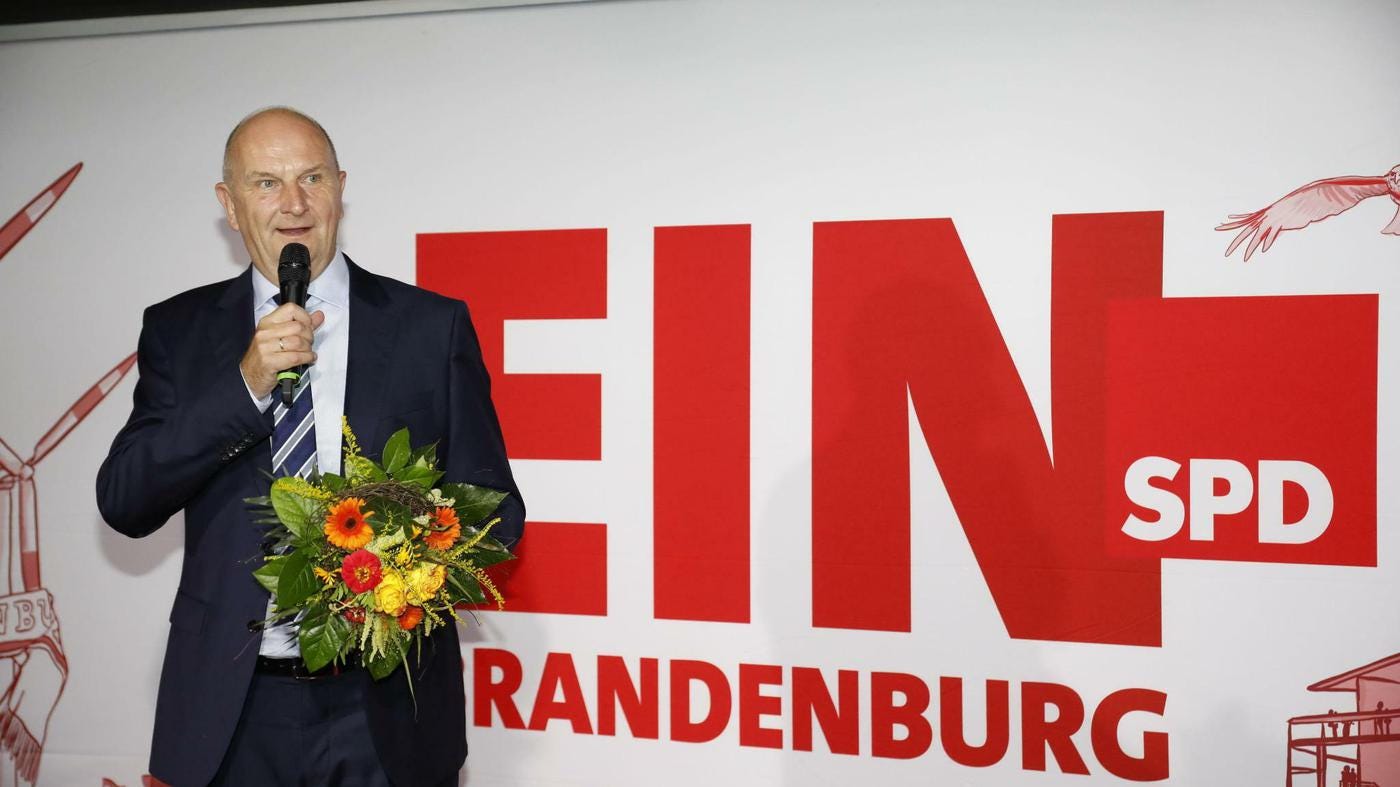Decapitation delayed
Scholz's party will delay 'doing a Biden', storing up more trouble for the future
A friend of mine who works for an international broadcaster asked me at the last minute if I was free for breakfast today. Or lunch. He was in Berlin but at a loose end because his desk wasn’t interested in a ‘live’ from him or a package any more. The AfD hadn’t won. Olaf Scholz wasn’t about to be booted out as Chancellor. On a busy news day, Germany had slipped down the ratings.
His frustration reminded me of my time as a foreign correspondent in the late 80s both in Bonn and in Berlin (East, where I was living, and West, which as a Brit I was allowed to pop over to pretty much as I pleased).
The barrier to entry for the German ‘story’ has always been high. It has to be something joyously momentous, or momentously joyous (?), such as the fall of the Wall and reunification.
Or, far more likely, it has to be grim and German/angsty, particularly if it allows the question - are we slipping back into the 1930s? Whenever, as a young hack keen to prove myself, I felt that I hadn’t got much in my newspaper - the Daily Telegraph at the time wasn’t my kind of politics but it was a respected, serious organization - I knew what to do. I scoured the local media across Germany for a neo-Nazi protest. It could be a dozen inebriated thugs running amok in some miserable post-industrial town that readers wouldn’t have heard of, but that was enough. Plonk. Front page.
Which brings me back to now. How do you ‘tell’ the German story? Is the country lurching to the far-right? Is democracy in danger? Is it ungovernable? The answer to all these questions is an emphatic ‘no’.
Is the government in deep trouble? Is the economy facing major structural problems? Are voters disillusioned and taking the easy populist way out? The answer to all these questions is an emphatic ‘yes’. That’s a less immediately ‘sexy’ story, but it is just as important, longer term.
The results of Sunday’s elections in Brandenburg, a region that surrounds Berlin like the outside of a doughnut, falls into that category. This was the third set of elections in September in the former Communist East and, though the results varied according to the popularity of local politicians, the trends are similar.
The three-party federal coalition of Scholz’s Social Democrats (SPD), the Greens and the liberal Free Democrats (FDP) is the most unpopular German government in living memory. And with good reason. It spends most of its time squabbling; it has achieved precious little of its ambitious agenda when it was formed in late 2021 (to be fair, much of its energy was taken up with Ukraine) and in Scholz it has a leader who is unable or unwilling to show leadership beyond tactical trickery.
Having been thumped in Thuringia (where the AfD won for the first time) and in Saxony (where the CDU narrowly prevailed), the SPD actually gained votes and share in Brandenburg. It did so because of one man and he sure as anything ain’t Scholz.
Minister-president of Brandenburg for the past 11 years, Dietmar Woidke is as close as they come to a genuinely popular politician. The son of a locksmith and book-keeper, he studied agriculture before gradually making his way up through local politics and administration. He is an Ossie with no controversial hinterland. He is unflashy and distinctly un-metropolitan in a region that is now a mix of rural, suburban and Wessie second-homers or digital nomads.
Brandenburg has been a stronghold of the SPD since reunification. But throughout this campaign Woidke told Scholz, publicly and privately, to steer clear - even though the Chancellor lives in Potsdam, the region capital, and his wife was until last year education minister in the Brandenburg government.
That was one reason why Woidke prevailed. Another was that he threatened to resign if he lost (something I’m told he would have carried out). Having trailed throughout, the SPD nipped over the line, with 31% to the AfD’s 29%.
In the final week before polling, Woidke urged all voters minded to vote for a mainstream party to lend him their support, to see off the far-right. That did for the Greens (who fell below the 5% threshold required to get into any legislature in Germany). It destroyed the FDP, who staggeringly garnered less than 1%. It also harmed the CDU, who came fourth with a poor 12%.
Thanks to the complicated arithmetic, the SPD will now have to govern in coalition with the insurgent BSW, a far-left-meets-far-right personality cult around Sahra Wagenknecht, a former Communist and Stalin supporter who now backs stiff immigration controls and is the stuff of Vladimir Putin’s dreams. (She has made stopping military support for Ukraine a pre-condition in negotiations). Bizarrely, mainstream parties refuse to deal with the AfD, but they are prepared to deal with her, at regional level at least.
So where does that leave us?
Had the SPD lost, the calls would have increased for Scholz to announce that, although he would continue as chancellor, he would not be offering himself as his party’s candidate for the general election in a year’s time. Yet, as one politician put it to me, ‘we don’t have a Nancy Pelosi’ - someone of authority in the party who could bring the boss (Joe Biden) the bad news that he was unelectable.
A man light on personal empathy but heavy on self regard, Scholz continues to argue that his party and his country need him to steer it through difficult times. It was helpful for all concerned that he was able to leg it to New York for the UN General Assembly on the eve of voting day.
Thanks paradoxically to Woidke, Scholz has bought himself some time. The man anointed as his replacement, Boris Pistorius, continues to be steadfastly loyal. Opinion polls have given him consistently high ratings ever since he was plucked out of obscurity two years ago to become defence minister. For Germany’s allies, Pistorius is a godsend, making the continuous case for the use of hard power and for more defence spending.
Yet on Ukraine, public opinion remains split. After spectacularly turning policy on its head with his Zeitenwende speech in February 2022, Scholz has provided large amounts of military kit for Kyiv, while being frightened of making the case back home.
That address was a rare moment of drama. German politics is usually incremental - hence hard for some foreign correspondents to get it onto the news. What is happening now is the slow debilitation of mainstream politics. It will take something spectacular, rather than steady, to turn things around - and to keep the press pack busy. Calling Frau Pelosi.





